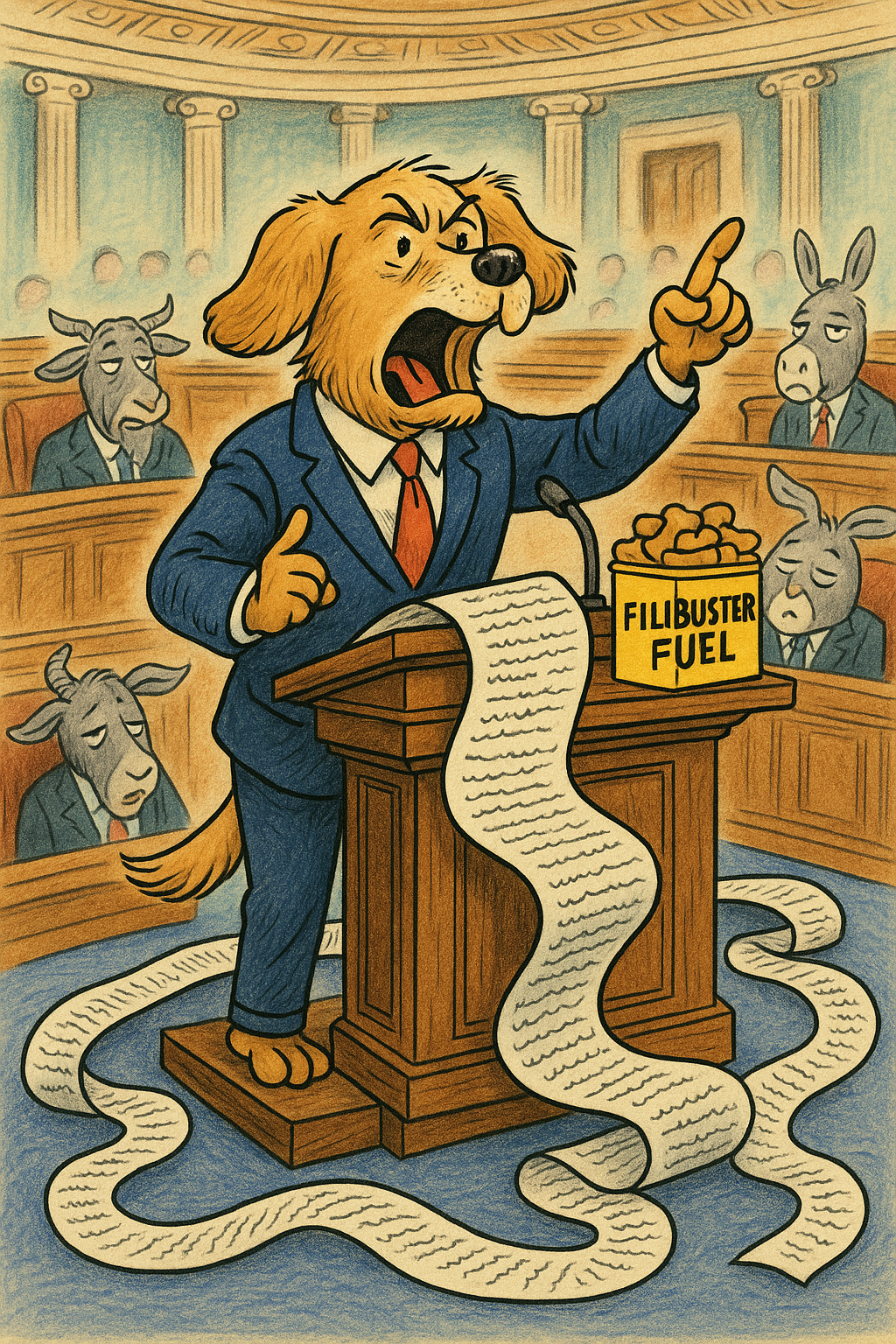The Filibuster and the Fire Hydrant: A Love Story

By Bob the Dog, Political Correspondent-at-Large and Obsessive-Tree-Sniffer
Democracy smells like a fire hydrant. Not the sanitized, civics-textbook version they peddle to schoolchildren alongside plastic presidents and freeze-dried founding fathers, but the real thing—rusted metal pungent with ammonia, wet concrete, and the collective piss-dreams of a republic in heat.
The hydrant stood there - fire-engine red, unapologetically squat - like some cast-iron temple goddess who'd survived the fall of civilizations and the rise of Instagram. Cold to the touch yet somehow radiating an erotic gravity that pulled at my canine loins with the force of a thousand tennis balls launched from the hand of God.
I spotted her outside the Capitol's north face, where the shadows grow long and senatorial aides abandon Bird scooters with the same casual indifference they display toward minimum wage legislation. Her bouquet—that intoxicating blend of oxidized iron, diesel runoff, and the ghostly markings of a thousand labradors before me—hit my snout like a hallucination wrapped in bacon. This wasn't just any hydrant.
This was THE hydrant.
The kind that visits you in REM sleep disguised as the moon, only to reveal her true identity when you wake up humping your owner's memory foam pillow.
But someone had already staked a claim.
His name was Fil—short for Filibuster—a cream-colored poodle clipped with the geometric precision of a hedge fund manager's conscience. He wore a bowtie that cost more than most Americans' health insurance deductibles and a Bluetooth earpiece perpetually connected to the void.
Fil didn't bark; he orated. He recited constitutional amendments while yoga posing. He once blocked a neighborhood dog park proposal by reading Joyce's Ulysses backward through a mouthful of rawhide. Fil didn't stand for anything because standing implied forward momentum, and forward momentum threatened the status quo. He preferred to hover, suspended in the privileged air of perpetual obstruction.
"Back off, mongrel," he sneered, flicking an ear with the dismissive authority of a Supreme Court justice swatting away human rights. "This hydrant transcends mere urinary function. It's a placeholder. A symbolic vestige. An obstructionist totem around which democracy itself must tiptoe."
"It's a goddamn fire hydrant," I countered. "It belongs to everyone."
"Not anymore." His aristocratic snout twitched with disdain. "I've marked it with my intentions. And my intentions, like corporate campaign contributions, flow without end."
Herein lies our tragedy: Filibuster had indeed claimed ownership not through superior strength or meritocratic achievement, but through procedural tyranny. Every approach by another dog - whether beagle, boxer, or bipartisan golden retriever—triggered his response: endless monologuing. Words without purpose except to fill time and space until the other dogs grew weary and abandoned hope, along with their bladders.
The hydrant transformed from communal relief station to monument of paralysis. Filibuster didn't love her as I did. He lusted after what she represented: the power to deny access, the exquisite ecstasy of "no."
I, however, loved her authenticity, her democratic utility, her silent fortitude. I dreamed of sharing her with others—terriers and hounds alike, even those insufferable dachshunds with their performative digging.
One night, beneath a moon hanging like a celestial treat just out of reach, I returned. The street lay empty. I approached without an agenda - no sniffing, no marking - and sat beside her.
"They've used you," I whispered. "Pissed on you more times than truth itself. But you matter beyond their territorial games. They built you to serve everyone - canine and human alike - not to languish as some committee members chair's private trophy."
The wind sighed across her flaking paint. Or maybe a nearby storm drain belched.
By morning, Filibuster had vanished. Perhaps he'd run out of words. Perhaps some squirrel podcast had finally captured his attention. All that mattered: the hydrant stood free - glorious and available for all public discourse and democratic discharge.
I approached her again.
This time, I sniffed deeply. She smelled not of defeat but possibility. I lifted my leg.
And together, fellow Americans, we flushed the system.